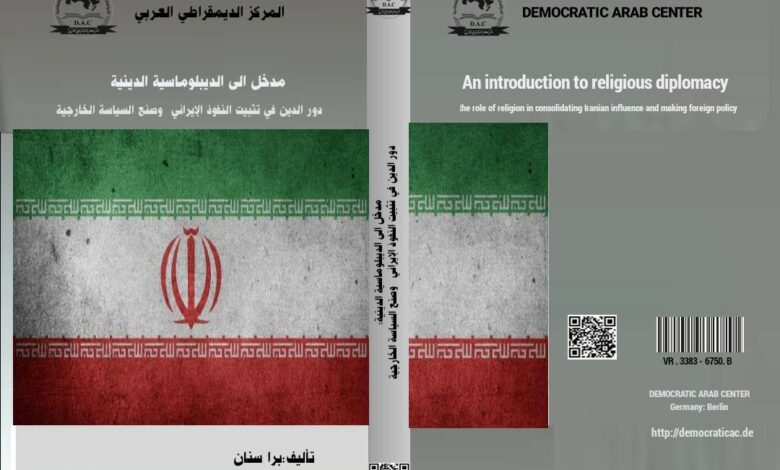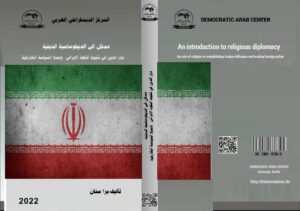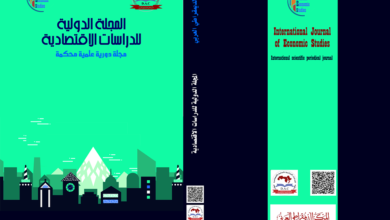مدخل الى الديبلوماسية الدينية : دور الدين في تثبيت النفوذ الإيراني وصنع السياسة الخارجية
An introduction to religious diplomacy: the role of religion in consolidating Iranian influence and making foreign policy

تألبف : برا سنان – باحث في العلوم السياسية والعلاقات الدولية – مهتم بالشأن الديني
نسخة “pdf”-
مدخل الى الديبلوماسية الدينية دور الدين في تثبيت النفوذ الإيراني وصنع السياسة الخارجية
الطبعة الأولى “2022″ –من كتاب: –
مدخل الى الديبلوماسية الدينية: دور الدين في تثبيت النفوذ الإيراني وصنع السياسة الخارجية
جميع حقوق الطبع محفوظة #المركز_الديمقراطي_العربي ولا يسمح بإعادة إصدار هذا الكتاب أو اي جزء منه أو تخزينه في نطاق إستعادة المعلومات أو نقله بأي شكل من الأشكال، دون إذن مسبق خطي من الناشر .
تقديم :
اضحى لمفهوم الديبلوماسية الدينية ضرورة اكاديمية بالغة الأهمية وهو كمفهوم وان كان حاضرا على مستوى التطبيق منذ قرون خلت ، الا انه وعلى مستوى التنظير من خلال الوعي بالدين وقوته واعتماده من منطلق برغماتي ، امر مستجد، ولكونه كذلك، فهذا يعني بداهة ان الديبلوماسية الدينية يمكن اعتمادها لتسوية النزاعات وخلق السلام وتعزيز الامن ونشرهما على المستوى الدولي والإقليمي لكل دولة ولكل شعب من الشعوب، وهذا هو المطلوب والمرغوب من الديبلوماسية بشكل عام، ومن الديبلوماسية الدينية من خلال فواعلها والياتها ووسائلها التي يأتي الدين في عمقها وجوهرها باعتباره أداة تقرب بين الأديان التوحيدية مثلا، بل ويمكن للدين التوحيدي ان يكون أيضا أداة لتعزيز وتقريب الشعوب بينها والتواصل مع مختلف الأديان والمعتقدات ، سواء مع معتنقي الأديان التوحيدية أي فيما بينها او غيرها من الأديان غير التوحيدية ، او مع من لا يعتنق أي دين ، لاسيما ان الانسان لا يمكن له ان يعيش بدون دين ولذا فان اللاديني نفسه يعتنق دين اللادين؟ .
في سبيل بحثنا عن تعريف الديبلوماسية نعتقد اننا اذا عرفناها بكونها ” ادفع بالتي هي احسن ” احسنا الوصف ، وفي محاولة البحث في خبايا المفهوم ، اوردنا العديد من التعاريف ، وصحيح جدا ان مختلف التعاريف تدور حول السلم والامن الدوليين كأحد اهم وظائف الديبلوماسية ، غير اننا سندفع بالقول ان ذلك يدخل ربما في سياق المدارس المثالية والتي تنظر لما ينبغي ان تكون عليه العلاقات الدولية بين مختلف الفواعل السياسية والدولية من دول ومنظمات وافراد ، بينما من مقترب واقعي فإن الديبلوماسية الدينية قد تكون أيضا ديبلوماسية دينية سلبية ، ونقصد بهذا ، ان يكون الدين احد الوسائل التي تستعملها الدول خدمة لمصالحها السياسية والوطنية ، و وسيلة لزيادة النزاعات والقلاقل والمشاكل داخل الدول غير الحليفة او الدول الأعداء ، باعتماد التمويلات التي تصب في زيادة الصراع الديني او ودعم الطائفية والمعتقدات التي تغذي النزعات الدينية التي يكون هدفها تمزيق الدول وتخريبها من الداخل بغية تحقيق اهداف سياسية من وراء ذلك ، من قبيل تقسيم الدول الى دويلات واقاليم يصارع بعضها بعضا ، وهو ما أشار اليه الاسقف جون برايسون شاين، القس الثامن في ابرشية واشنطن قائلا:” يمكن للدين في القرن الواحد والعشرين أن يكون قوة تمكن المصالحة والاستقرار السياسي أو اسفينا يعزز الانقسام…وقد حان الوقت الان لاستخدامه في المصالحة وصنع السلام الديبلوماسي”.
ولقد ابتدأنا السلسة المعنونة ب” مدخل نحو الديبلوماسية : الدين في صنع السياسة الخارجية ” ، بجمهورية ايران الإسلامية ، حيث شكلت الثورة الإسلامية فيها ، نقطة مفارقة وخصوصا بعد سقوط ما يسمى بنظام الخلافة، لتصبح محط انظار الكثيرين من زعماء الدول ، وزعماء الحركات الإسلامية ومن ليبراليين ومن مجتمع دولي .
غير اننا وقبل الانطلاق في تحديد معالم ومحددات السياسة الإيرانية الخارجية ، كان لا مناص من تقريب القارئ بداية الى مصطلحات ومفاهيم تنتمي لحقل السياسة والعلاقات الدولية والقانون العام ، وعليه كان من الضرورة المنهجية ان نعرف بداية ماهية الدبلوماسية وتاريخها ، أنواعها بحيث استشكل على البعض هذا التنوع الحاصل بين مختلف الديبلوماسيات فحاولنا تقديم معايير معرفية لمحاولة احتواء مختلف هذه الديبلوماسيات المتعددة .
كما حاولنا الإشارة الى نقطة نعتقد انها بالغة الأهمية وهي دور الدين في الغرب فلربما يجهل او قد يختلف معنا القارئ في هذا، غير اننا سنورد بعضا من الأدلة والحجج لنرى ان الدين لم يخفت ولم يختف بتاتا في التجربة الأوروبية والغربية ، بل كان حاضرا في كثير من المحطات التاريخية والازمنة ، فان قيل هذا كلام لا غبار عليه لكن تم دفنه بعدها ، فالإله قد مات ، نقول ان هذا الامر هو ما قد نختلف فيه ، فان الغرب قام بإعادة موضعته ليكون في صالح الانسان بدل ان يقف عائقا امام الحياة ، غير انه ومع ذلك لا يزال يشكل بعدا من ابعاد العقل اللاواعي وليتجلى في السلوك الخارجي للإنسان الغربي ، او للدولة الغربية بتجليات مختلفة ، فيظهر في لحظات معينة بشكل واضح جدا وقد يتوارى في احايين أخرى
وفي الفصل الثاني تم تحديد مجال الاشتغال وهو الديبلوماسية الدينية الإيرانية فتم بداية سؤال الهوية والتعرف على ايران من خلال محاولة معرفة من هي ايران ؟ ثم بعد ذلك الى أي حد يشكل الدين فاعلا أساسيا في صنع القرار السياسي الخارجي والعقل الإيراني عموما ، ثم الاشتغال عمليا على علاقة ايران بجوارها و ذلك من خلال كيف تتعامل ايران مع دور الجوار من السعودية والبحرين والعراق والامارات العربية المتحدة وقطر بل وكيف صارت ايران تحاول وهي تنجح في ذلك بان تضع لها موطئ قدم في القارة الافريقية محور لربما حروب المستقبل وهي القارة السمراء الغنية والتي تتجه لها اعين الدول الكبرى والقوية وصارت محل نزاع بين الأوروبيين والاسيويين والروس .
Abstract
The concept of religious diplomacy has become an academic necessity of great importance. As a concept, although it was present at the level of application centuries ago, it is at the level of theorizing through awareness of religion, its strength, and its adoption from a pragmatic standpoint. Conflicts, creation of peace, promotion of security and their deployment at the international and regional level for every country and for every people, and this is what is required and desirable from diplomacy in general, and from religious diplomacy through its actors, mechanisms and means, in which religion comes in its depth and essence as a tool of rapprochement between monotheistic religions, for example, and it is even possible The monotheistic religion can also be a tool for promoting and bringing people together and communicating with different religions and beliefs, whether with adherents of monotheistic religions, i.e. between them or other non-monotheistic religions, or with those who do not embrace any religion, especially since a person cannot live without religion and therefore The non-religious person himself embraces the religion of the non-religious? .
In our search for the definition of diplomacy, we believe that if we define it as “pay with what is best,” we describe it well, and in an attempt to research the mysteries of the concept, we have included many definitions, and it is very true that the various definitions revolve around international peace and security as one of the most important functions of diplomacy, but we will pay By saying that this may be included in the context of ideal schools that look at what international relations should be like between various political and international actors such as countries, organizations and individuals, while from a realistic approach, religious diplomacy may also be negative religious diplomacy, and by this we mean that religion is one of the means Which countries use to serve their political and national interests, and a means to increase conflicts, unrest and problems within non-allied or enemy states, by adopting funds that increase religious conflict or support sectarianism and beliefs that feed religious tendencies whose aim is to tear states apart and sabotage them from within in order to achieve political goals Behind this, such as dividing countries into states and regions that struggle with each other, which was indicated by Bishop John Bryson Shine, Rev. Eighth in the Archdiocese of Washington, saying: “Religion in the twenty-first century can be a force that enables reconciliation and political stability, or a wedge that strengthens division … and now is the time to use it in reconciliation and diplomatic peacemaking.”
We started the series entitled “Introduction to Diplomacy: Religion in the Making of Foreign Policy” in the Islamic Republic of Iran, where the Islamic Revolution constituted a turning point, especially after the fall of the so-called caliphate system, to become the focus of attention of many leaders of countries, leaders of Islamic movements and those Liberals and the international community.
However, before embarking on defining the parameters and determinants of Iranian foreign policy, it was inevitable to bring the reader closer to terms and concepts belonging to the field of politics, international relations and public law, and accordingly it was a methodological necessity to know the beginning of what diplomacy is, its history, its types, so that this diversity was shaped by some. Between the various diplomacy, we tried to provide knowledge standards to try to contain the various of these multiple diplomacy.
We also tried to point out a point that we think is very important, which is the role of religion in the West, so the reader may be ignorant of it or the reader may disagree with us on this. However, we will cite some evidence and arguments to see that religion did not disappear and did not disappear at all in the European and Western experience. Rather, it was present in many Historical stations and times. If this was said, there is no doubt about it, but it was buried after that, then God is dead. We say that this matter is what we may disagree about, because the West has repositioned it to be in the interest of man instead of standing as an obstacle to life. It still constitutes a dimension of the unconscious mind and is manifested in the external behavior of the Western man, or of the Western state in various manifestations. It appears at certain moments very clearly and may disappear at other times.
In the second chapter, the field of work was identified, which is Iranian religious diplomacy, so the question of identity and identification of Iran began by trying to find out who Iran is? Then, to what extent is religion an essential factor in foreign political decision-making and the Iranian mind in general, and then to work practically on Iran’s relationship with its neighborhood, through how Iran deals with the neighboring role of Saudi Arabia, Bahrain, Iraq, the United Arab Emirates, and Qatar, and even how Iran is trying while it is It succeeds in that by establishing a foothold in the African continent, a focus for perhaps future wars, which is the rich brown continent, to which the eyes of the big and powerful countries tend, and it has become a subject of conflict between Europeans, Asians and Russians.
- الناشر: المركز الديمقراطي العربي للدراسات الإستراتيجية والسياسية والاقتصادية





